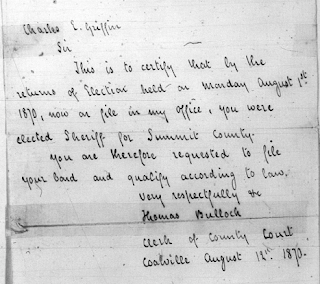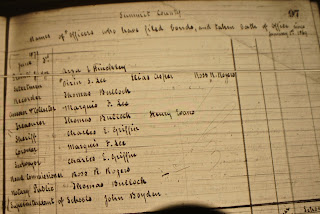The name of C. E. Griffin is found frequently in the
documentary history of Summit County. This documentary trail tells the story of
a man deeply involved in the development of the County. When anyone walks a
city street in the various towns in the County or drives along a County road
they are in all likelihood following in a pathway laid out by C. E. Griffin. In
1974 the State Highway department published a PLAT MAP of Coalville. If we were able to find the original survey
made by C. E. Griffin it would mirror the 1974 edition. Somewhere in the 1870
PHOTO is the house built by Charles. In what was probably the earliest HISTORY
written for Summit County the author included a full page on Charles Emerson
Griffin. He quotes Charles’ autobiography as an authoritative source on early
County history. Charles made his first foray into Summit County in 1860 and
quickly became deeply involved with county and city government. He served in
the courts, as assessor and surveyor. He also served as a deputy sheriff. He
left in 1865 only to return in 1866. On his return he was quickly recruited to
full his previous roles. Over the next eight years his involvement increased.
At one time he served as head of three major departments in county government,
the Sheriff’s office, as county surveyor and as the county assessor. He
simultaneously held most of those jobs at the city level in Coalville.
In his personal papers Charles had a RECIEPT for taxes he had
collected as “assessor and collector for Summit County”. It is dated Feb 11th
1867. As a bit of a historical twist note that is signed by Wm. Clayton the
author of the famous Mormon hymn, Come Come ye Saints.
We also find a reimbursement RECORD from the road supervisor
for survey work. The record includes the name of Charles E. Griffin, which
implies that he had quickly returned to that role.
In the midst of the Black Hawk War it is no surprise that
Charles was almost immediately drafted into service in the Summit Military
District. He was appointed Captain and battalion adjutant.
In 1868 he is drafted to serve as a DELEGATE to the
Republican convention representing the city of Coalville.
Charles was caught up in a small pox epidemic in 1869. There
is a detailed DOCUMENT in the county records that outlines the county’s
response, which included placing a quarantine on a number of families including
the Griffins.
There are a number of documents that indicate that Charles
had established a teamster business. The business required that he produce
grain and forage sufficient to feed his animals. We get some hints at the size
of his teamster operation in a DOCUMENT that notes he offered as a bid 4,000
bushels of wheat. We also find documents that indicate that he was appointed
POUNDKEEPER. Another DOCUMENT indicates that the poundkeepers kept the
impounded animals in their own corrals and fed them using his own resources to
be later reimbursed by the county.
In his own personal papers Charles had retained the OFFICIAL
NOTIFICATION sent to him regarding his election as County Sheriff in 1870 and
1872. There are a number of documents that track his involvement in the
sheriff’s office. We find a DOCUMENT that records his nomination for the office
at a county convention. There is a DOCUMENT that denotes a request for extra
pay for extra services rendered. There are documents that record the amount of
the BOND he posted before assuming the office as sheriff.
There are any number of DOCUMENTS that record his busy
service in the courts.
One of the DOCUMENTS that I find the most telling is a
report on delinquent taxes that he prepared. It is beautifully written in what
became his signature writing style. It is well written and organized. The
calculations that are included clearly demonstrate his ability as a
mathematician.
As per western history we tend to romanticize the role of
Sheriff, However I think it was as county surveyor that Charles left his most
lasting legacy. Charles had begun his career as a surveyor early on in his
arrival in Summit County. When he left for Long Valley his resignation from the
post was duly recorded. There are clear indications that when he reappeared in
1866 he was quickly drafted back into service. There is a DOCUMENT that notes
that when the sitting county survey resigned the county quickly turned to
Charles as a replacement. We find the RECORD for the bond he posted before
assuming the office after he was elected in the next election cycle. The same
bond also indicates that as a subset of his survey work he served as a “road
supervisor”. The most telling document relating to his work as a surveyor are
MINUTES in the county records that make note of a report presented by Charles
E. Griffin on the county roads.
Found in the church records in Coalville are the baptismal
and confirmation records for Joseph and Hannah Griffin. The birth and blessing
record for John Griffin are also included.






































No comments:
Post a Comment